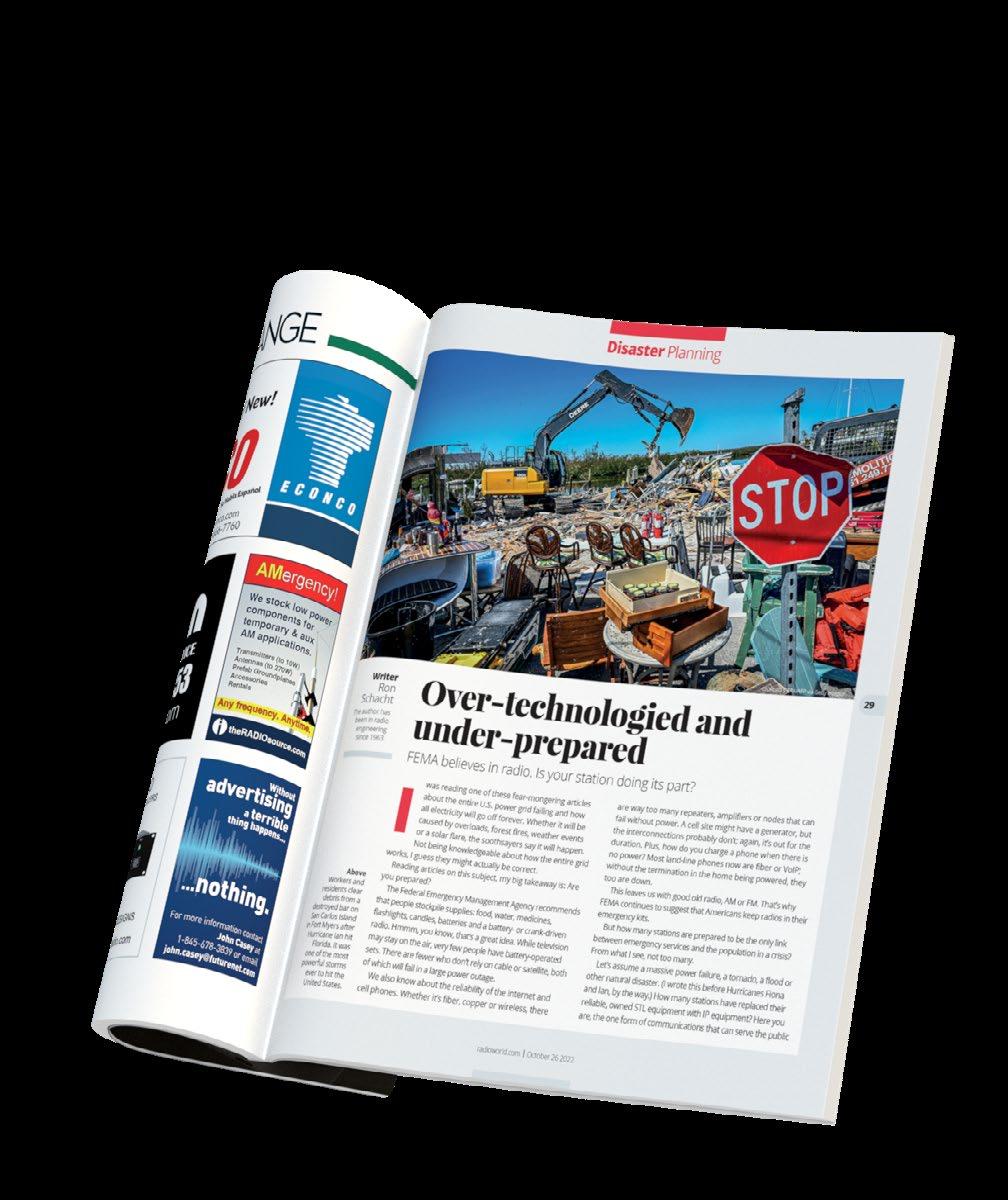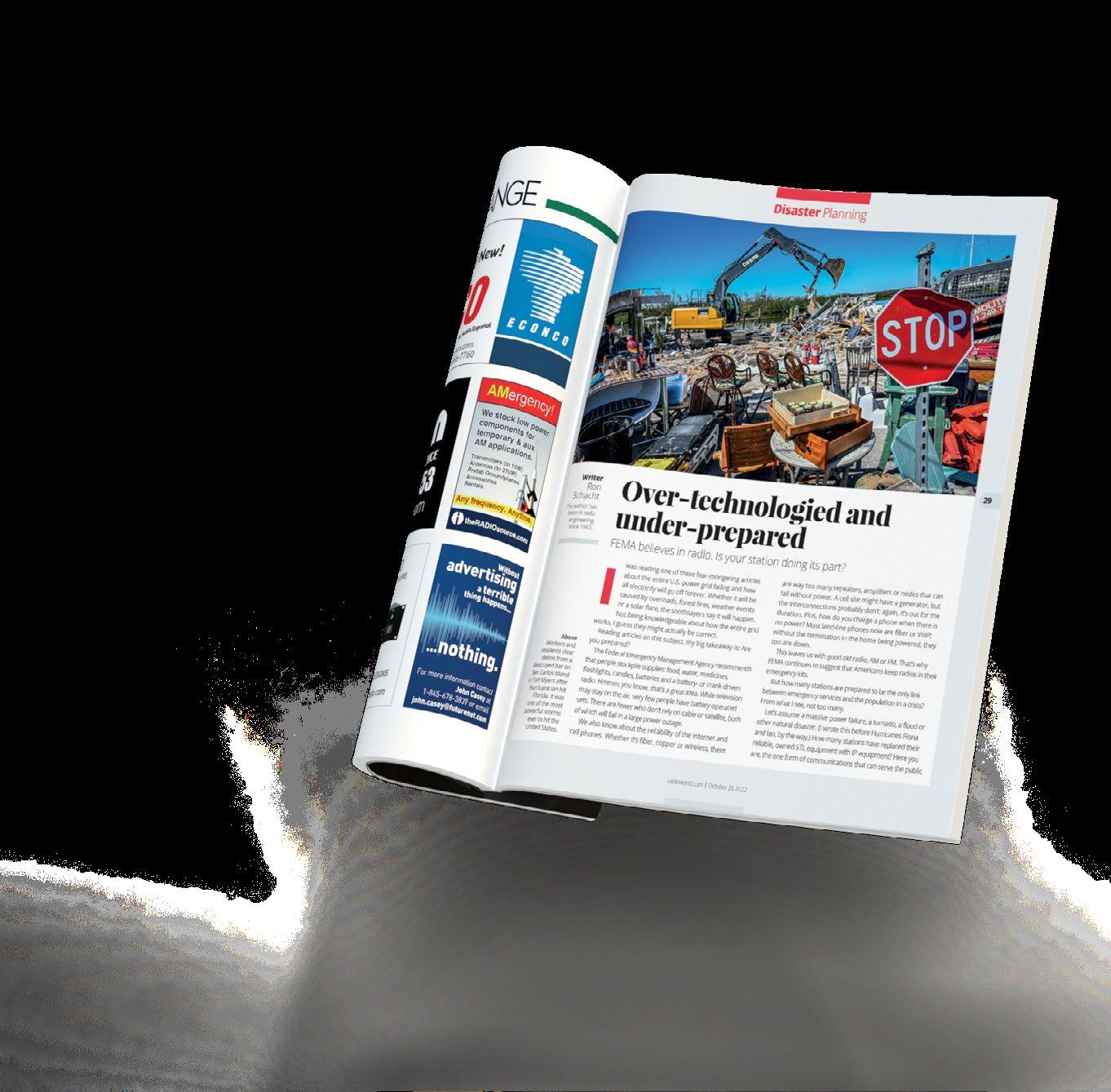
3 minute read
How you can help NWR


John Fogarty, James Bacchioni and Brittany Samuels covering sports on OWWB.
may create or improve the station’s website or produce content for access on-demand or via podcast.
The opportunities are almost endless. A PD or GM may learn management, scheduling, mentorship and the importance of deadlines and goals. Their roles demand discipline, sacrifice, teamwork and other transferrable skills.
Student managers may also have to fix that darn EAS machine — unless there’s a bright-eyed student with a tech-geek streak who gladly will assume ownership of problem-solving and infrastructure management. With technical people in such demand in and out of our industry, a college radio station is a great place to hone broadcast and IT skills in a demonstrable way.
Many college radio stations have been recognized with regional and national awards for work in all aspects of production, content, context and delivery.
College stations are also interactive multimedia facilities where students can learn about video, podcasting, social platforms and so many of today’s important media tools.
Unlike any other
College radio still matters. Ask our students, ask our listeners, ask me or any of us around the world who lead college stations.
Ask Rob Quicke of WPSC(FM) in New Jersey, founder of World College Radio Day. Ask the folks at the Intercollegiate Broadcasting System. Ask the College Media Association and its members.
My mantra is that college radio is not a right, it’s a privilege. The radio medium is unlike any other thanks to its immediacy and intimacy. And we have a responsibility to use it well for our listeners and our communities as well as our students and our institutions.
Thanks for listening.
The author has more than 25 years of broadcast and college radio experience. He is a lecturer in the American Studies/ Media & Communications department at State University of New York College at Old Westbury.
Readers’ Forum
How you can help NWR
I enjoyed reading Ron Schacht’s article in the Oct. 26 issue, “FEMA Believes in Radio. Is Your Station Doing Its Part?”
I started at KFRU(AM) in Columbia, Mo., in the late 1970s, and we prided ourselves on our severe weather coverage. KFRU encouraged everyone to have a NOAA Weather Radio (NWR) so they could receive alerts in the middle of the night, then tune to KFRU for lifesaving storm tracking and protective information, which was a huge ratings booster.
During my 30+ year on-air career, I worked for three stations that understood the importance of NWR and proudly hosted it on their towers, as a public service.
The National Weather Service operates 1,033 NWR transmitters that send their signals to 94% of the U.S. population in all 50 states and five U.S. territories.
The cost to run this network is $16 million per year. Increasingly, this budget is being severely affected by rising, often exorbitant tower rental rates, with approximately 40% of the yearly NWR budget consumed by tower rental alone.
This severely hinders the ability of NOAA to maintain, improve and expand its radio network.
Broadcasters: When NOAA comes looking for tower space, let them onto your tower at a rate that enforces your commitment to serve the public interest, convenience and necessity. The NOAA transmitter you host is the source of lifesaving information your station can use to super-serve your audience during times of danger.
Re-packaging and disseminating official watch and warning information affects listeners in a way that creates lifelong fans of YOUR station because you saved their lives. On a related note, bipartisan bill H.R. 5324, the NOAA Weather Radio Modernization Act of 2021, passed the U.S. House almost unanimously and as I write it is in
How to the Senate, awaiting approval. All broadcasters should submit contact their senators and ask them to pass HR-5324
Radio World welcomes before the end of this year. It directs NOAA to allocate comment on more of its current budget to improve NWR by replacing all relevant outdated copper-wire transmitter links with more reliable topics. Email radioworld@ microwave, IP and satellite comms, bringing this 60-yearfuturenet.com old broadcast network into the 21st century. Thanks for with “Letter helping us build a Weather-Ready Nation.to the Editor” in the subject Bruce T. Jones field. Meteorologist/Spokesperson Midland Radio Corp.








